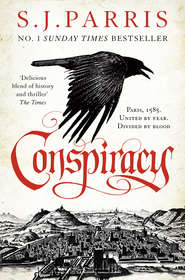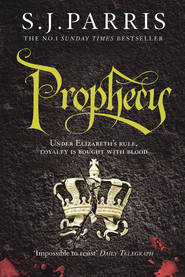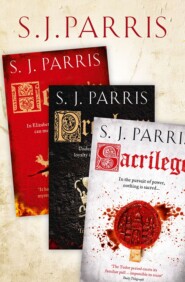По всем вопросам обращайтесь на: info@litportal.ru
(©) 2003-2025.
✖
Treachery
Автор
Год написания книги
2019
Настройки чтения
Размер шрифта
Высота строк
Поля
‘Speak for yourself.’
‘I do. I have told you already, I would be no use at sea. They would rather conserve the rations, I’m sure.’
‘And yet.’ Sidney regards me with his head on one side, as if an idea has just struck him. ‘He is interested in you. He asked me to bring you. What is this book he wants to show you in particular, I wonder?’
‘Something to do with ancient languages.’
‘Odd – he doesn’t strike one as the type to pore over antique texts. He seemed to imply it was connected to the murder.’ His eyes grow briefly animated, until he remembers his grievance. ‘Well, either way, we must give him what he wants, Bruno. Let us find his killer, read his book, whatever we must to show him we have skills he can use.’
I say nothing, only pick up my bag and begin walking, with a strange lurching motion, in the direction of the houses. Sidney falls into step beside me with his long loping stride, pensive and silent. I see clear as day what he does not, or will not acknowledge: Drake does not want him on this voyage. Even if we found Robert Dunne’s killer tomorrow and presented him to the Captain-General bound and gagged by dinner, I do not think it one whit more likely that Drake would take us on board. There is no point in saying this to Sidney.
‘You know, tomorrow,’ he mutters, as we turn into a narrow cobbled street that curves steeply upward from the harbour wall, ‘I think I will make it my business to visit all the larger ships of the fleet and discuss the armaments with their captains. That way they will know I am here as Master of the Ordnance, not merely an escort to exiled princes and Drake’s womenfolk. I will not have these sailors laughing at me behind their hands.’
‘But you don’t know anything about ordnance. Not when it comes to using it. They may laugh directly in your face if you pretend to knowledge you don’t have.’
He glares at me, then breaks into a grin. ‘If you affect to know what you are doing, most people will take you at your own evaluation. I believe it was you taught me that, Bruno.’
I smile, to concede the point. ‘I am not sure that will work with men who have sailed around the world once already.’
We find the sign of the Star readily enough on Nutt Street, a broad thoroughfare lined with tall, well-appointed houses. Sidney explains his connection to Drake and pays for a room, demanding – as if in parody of himself – linen sheets and a feather mattress; while he is haggling with the landlady over the best chamber I glance around the entrance. It is a fine building, perhaps a century old or more, and grand in the plain style of the times: broad flagstones on the floor, strewn with rushes; limewashed walls; a high ceiling with wooden beams. The candles in the wall sconces are beeswax, not cheap tallow, and there is a warming smell of roasting meat and spices drifting from the tap-room. And yet I find I do not like the place. Some nameless instinct makes my skin prickle; my fingers stray to the small knife I carry at my belt and stroke its smooth bone handle for reassurance. I sense something here that makes me uncomfortable, though I cannot explain why. When I remark on this to Sidney as we climb the stairs to our room, he only laughs.
‘Relax, Bruno – Robert Dunne’s murderer is back on the Elizabeth Bonaventure. He’s not going to come creeping in here in the night looking for you. Besides, this is the only decent inn in Plymouth – I’m not moving because you have a feeling in your waters, like the village wise woman.’
I laugh with him; he is probably right. But I can’t shake the notion that someone’s eyes are on us, and they are not friendly. When we come down to the tap-room for a last drink before bed, I pause in the doorway while Sidney finds a seat, scanning the tables, the other men ranged on benches. The inn is busy; anyone within twenty miles who has produce to sell will have heard that Drake’s fleet is at anchor here, and know that where there are ships, there is an insatiable demand for provisions. Two thousand five hundred hungry men altogether in the fleet, according to Knollys, and for every day the voyage is delayed, those men have appetites of all kinds that must be fed.
I push through the crowd while Sidney goes to the serving hatch, my eyes still sweeping the room for a seat, when a knot of people suddenly parts and I see a figure at the end of a wooden bench, in the shadows of a corner, close to the outer door, staring at me. I don’t have a clear sight of his face; he wears a shapeless hat pulled low, and a black travelling cloak, though the room is stuffy. All I see is that he is looking directly at me, but there is something about the shape of him, the way he hunches into his chest, trying not to be noticed, the way his eyes burn from under the brim of his hat, that echoes in my memory; I feel certain I have seen him before. I turn to Sidney to point the man out, but someone blocks my view and when I look back he is gone and the door is banging hard. Without waiting, I shove past a group of merchants, ignoring their aggrieved cries, and fling myself out into the inn yard, wheeling around for a sight of the stranger in his cloth hat.
The yard too is busy; horses, carts, stable lads, travellers dismounting. Boys cross back and forth hefting bales of straw or gentlemen’s panniers, sidestepping to avoid one another, their timing as precise as a dance. There is no sign of the man in black. Dodging the bustling people and the piles of dung, I chase out of the high gates and into the street, looking left and right. He is gone, and the light is fading. Clouds have crept in and banked up over the town while we were indoors. Sidney arrives beside me, a tankard in each hand, following my gaze with a perplexed frown.
‘What are you doing out here?’ he says.
‘That man in black, skulking in the corner. You saw him?’
‘I saw a good forty men in that room, at least half of them wearing black. What about him?’
I shake my head. ‘He was watching us. I am certain of it. When he realised that I had seen him, he ran.’ I hold my arms out to indicate the empty street. ‘But where to?’
‘Who would be watching us?’ Sidney follows my gaze up the street, sceptical. ‘No one knows we are here.’
‘I don’t know. Though I have seen him before, I am sure of it.’ But as I look around, watching the last few passers-by making their way home as night falls, I begin to doubt my conviction. I have made enemies during my time in England, but none of them could have known I would be here. The years I spent on the run in Italy, when I first fled my monastery, taught me what it meant to live always looking over your shoulder, watching every crowd for a hostile face, for the man with his hand tucked inside his cloak. I had thought in England I would be free of that, but the work I have done for Walsingham has meant that, even here, there are those who hate me enough to want to kill me. I take a deep breath; last year, when I thought I was being followed around London, I vowed I would not become one of those men who jumps at shadows and draws his knife each time a dog barks. But the man in black was real enough. I only wish I could place him.
‘Well, you’re supposed to be the memory expert,’ Sidney says, cheerfully. ‘If you can’t remember a face, what hope for the rest of us?’
‘I didn’t see his face. It was more – his demeanour.’
He gestures towards the inn with his ale. ‘For God’s sake, come in and have a drink. You can sleep with your dagger drawn if it makes you rest easier.’
He thinks, though he would not say so, that I have imagined the man in black, or at least imagined his interest in us. Perhaps he is right. We make our way back in silence. There is no sign of the man when we pass through the tap-room, though the same sense of unease lingers. Any doubts I had about the voyage have only been redoubled by the day’s events and the prospect of entangling ourselves in another murder, and one that is no business of ours. Sidney stays below in the tap-room, drinking with strangers; I lie on my bed, staring at the map of cracks in the ceiling plaster. Everywhere I turn, it seems, my life is in jeopardy, whether out to sea, back to France or even here in Plymouth. I do not sleep with my knife drawn, but I keep it beside my bed, and when Sidney rolls in later, he finds me sitting bolt upright the instant the latch creaks, one hand already reaching for it, and the sight makes him laugh.
FOUR (#ulink_a459daf6-3f98-531d-a58b-abd76e12edd4)
I break my fast alone the next day; Sidney is ill-tempered after his late night, and lies moaning and tangling himself in sheets while I wash. He says he is not hungry. I take some bread and cheese and small beer at a long table with other travellers in the tap-room. My fellow guests regard me briefly with bleary eyes, before returning their attention to their food; I am by no means the only person with a foreign aspect here and I reflect that this is one advantage of a port town. The sky outside is dull, the grey-yellow of oyster flesh, and in the flat light my fears of last night shrink and lose their substance, until I can almost laugh at myself. I glance occasionally to the seat by the door where the man in black had been sitting, and wonder if I did imagine his malevolent stare after all.
The morning passes slowly. Sidney frets and chafes like a child kept from playing outside, waiting for some word from Drake. He suggests walking down to the harbour and finding someone who will row us out to the ships for a fee, but I talk him out of it, reminding him that Drake said he would dine with us at the Star at midday. Until then, there is nothing to do but wait. I try to read but his pacing up and down the room muttering makes that impossible; eventually I suggest a walk and he agrees. Overhead the clouds threaten rain; I glance up, pull my cloak closer around me and think with longing of the skies over the Bay of Naples.
The quayside is a bustle of activity. Small fishing boats negotiate their way around one another in an elaborate dance as they move toward the harbour entrance; men call out from the jetties as ropes are thrown to and from vessels and barrels of fish hauled ashore. Broad, red-faced fishwives are gathered with their trestles and knives at the dockside where the goods are unloaded, their hands silvered and bloody. Ever optimistic, the gulls circle boldly a few feet above their heads, screeching like a Greek chorus. The smell of fish guts carries on the wind.
We walk along the harbour wall as far as the old castle with its four squat towers, built on the headland to defend the harbour. Ivy and creepers hang like cobwebs from its stonework, giving it a neglected air. The sight of the ships out at sea only serves to darken Sidney’s mood.
‘I had far rather be out there, Bruno, whatever work they put me to.’ He waves a hand towards the Sound, where the Elizabeth Bonaventure bobs like a child’s painted toy.
‘I know. You have said so.’
Then his face brightens. ‘I had some interesting conversation in the tap-room last night after you retired. Concerning our friend Robert Dunne. Do you want to hear?’
‘Ah, Philip. Is that wise? Drake wants the man’s death regarded as a suicide – he will not thank you for fuelling speculation among the townspeople with too many questions.’
‘Before you start chiding like a governess, I asked no questions – as soon as the traders in the bar learned I was connected to the fleet, there was no holding them back. And if Drake thinks he has silenced all speculation with the report of suicide, he is sorely mistaken.’ He rubs his head and winces. ‘By God, that ale is strong. We should turn back, you know. Drake may be there already, waiting for us.’
The sun lurks dimly behind veils of cloud, almost directly overhead. We turn and follow the path back towards the town.
‘The townspeople talk of murder, then?’
‘Murder, witchcraft, curses – you name it. The sailors are not popular in Plymouth, for all the people here depend on them for a living.’ He glances around for dramatic effect, though there is no one else out walking. A sharp wind cuts across the headland; up here it feels more like November than August.
‘So it seems,’ he continues, ‘that our friend Dunne—’
‘Stop calling him that.’
‘Why?’ He frowns. ‘Why are you so irritable today? I’m the one who’s been poisoned by that ale.’
‘He wasn’t our friend, and we have no reason to be poking about in the business of his death. It sounds as if you are making light of it.’
Sidney takes me by the shoulder. ‘His death, as I have already explained to you at least three times, is our ticket on board that ship there.’ He points. ‘A ship that in a year’s time will come back to this harbour so weighed down with gold you’ll barely see the bowsprit above the waves.’
I do not bother to argue. ‘Go on, then. Dunne.’
He clicks his tongue impatiently and pulls his hat down tighter against the wind. ‘Robert Dunne was well known in Plymouth, they said. He had been living here for the past few months, though his home was in Dartington, a day’s ride away.’
‘Not on good terms with his wife, then?’
‘That’s part of it.’
The path begins to slope down towards the street that runs alongside the inner harbour, where the little fishing boats are moored. Below us, men sit on upturned barrels on the quay, mending nets or examining sailcloth. A group of small boys are scuffling on the harbour wall, fistfighting or trying to hit gulls with their slingshots. Occasionally a pebble goes astray, and one of the fishermen raises a fist and shouts a bloodthirsty curse as the boys dart away in a gale of raucous laughter. I wait for Sidney to elaborate.
When he is certain I am paying attention, he leans in closer and lowers his voice.
‘Apparently Dunne was a regular at the town’s most notorious brothel. A place they call the House of Vesta.’











